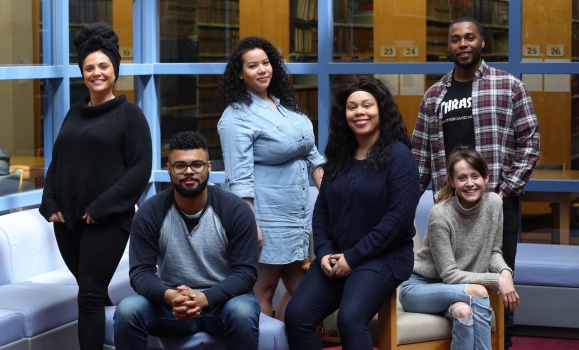This article is part of a series highlighting the Dalhousie Class of 2018 — the graduates of Dal's 200th year. Read more of our Spring Convocation grad profiles.
Professor Michelle Williams is the director of the Indigenous Blacks & Mi'kmaq (IB&M) Initiative at the Schulich School of Law, established in 1989 to increase the representation of its nakesake groups in the legal profession in order to reduce discrimination. This year it graduates its 200th student — a fitting milestone in Dal's 200th year. Here, she shares some thoughts on the meaning of that milestone and the initiative's legacy more broadly.
Two hundred years ago, Mi’kmaq, Maliseet and Passamaquoddy First Nations had concluded a series of Peace and Friendship Treaties with the British Crown. Despite these nation-to-nation legally binding agreements, Mi’kmaw people were subjected to an oppressive campaign of colonization — the effects of which continue today.
Two hundred years ago, African Nova Scotians were living as both enslaved and free people in segregated communities throughout the province and subject to persistent anti-Black racism — the effects of which continue today. The law played a central role in creating and maintaining these structural inequities.
As Dalhousie University celebrates its 200th anniversary in 2018, the Indigenous Blacks & Mi’kmaq (IB&M) Initiative stands on the shoulders of the freedom fighters who made it possible for Mi’kmaw and African Nova Scotian people to attend law school, and in turn join the work to effect justice for our communities and all Canadians. This year, the 200th law graduate admitted to the Schulich School of Law through the IB&M Initiative will celebrate with the Class of 2018.
As we celebrate, we remember Donald Marshall Jr., a young Mi’kmaw man who was wrongfully convicted and imprisoned for a murder he did not commit. We also remember Sandy Seale, the young African Nova Scotian man who was the victim of that murder, which was actually an anti-Black hate crime committed by Roy Ebsary.
We remember one of our notable law graduates, the late Dr. Burnley “Rocky” Jones (’92), who joined with members of the Mi’kmaq First Nation and African Nova Scotian communities and the law school faculty to launch the IB&M Initiative in 1989, echoing the Dalhousie University Task Force on Access for Black and Native People, which released its report that same year.
During its 29-year history, the IB&M Initiative has grown to become a model for access to legal education in North America thanks to the tireless efforts of community supporters, students, alumni, faculty and staff—and institutional support from Dalhousie University, the Law Foundation of Nova Scotia and the Nova Scotia Department of Justice. It received the Canadian Bar Association Touchstone Award in 2010, the Canadian Race Relations Foundation Award of Excellence in Education in 2014 and the Lexpert Zenith Award for diversity and inclusion in 2016.
Our students make an extraordinary contribution through a range of organizations such as the Dalhousie Indigenous Law Students’ Society (DILSA) and the Dalhousie Black Law Students’ Society (DBLSA). Over the years, the Initiative has produced numerous valedictorians, David Jones Memorial Award recipients for inspirational character and recipients of the Donald Marshall Jr. Award and the Judge Corrine Sparks Award.
Every day, students and alumni give life to the IB&M Initiative mandate, which is to reduce structural and systemic racism and discrimination in the legal profession by increasing the representation of African Nova Scotian and Mi’kmaw, as well as other Black and Indigenous students. Our students and alumni are leaders and catalysts for change beyond the legal profession, ensuring that the next 200 years — the next seven generations — are marked by reconciliation and reparations.
Comments
comments powered by Disqus

